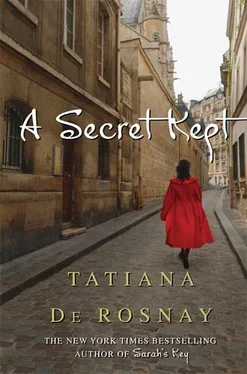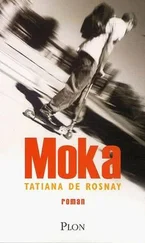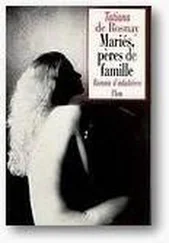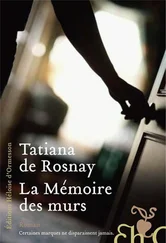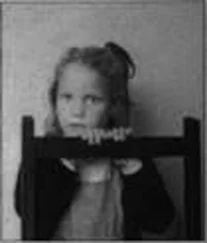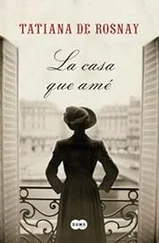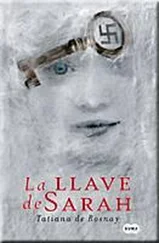I light a cigarette and smoke it with relish. I can’t bear the idea of going back inside and having to talk to my father. So I smoke another one and enjoy it just as much. They are on their way. With or without Serge? I wonder.
When I come back to Mélanie’s room, I find our half sister, Joséphine, lolling against the wall. She must have come with our father. I am surprised to see her there. She isn’t particularly close to Mélanie. Or to me. I hadn’t seen her for months, probably since last Christmas at the avenue Kléber. We go to the empty cafeteria on the ground floor. Mélanie is apparently resting, and our father is sitting in his car, on the phone.
Joséphine is fashionably thin, wearing low-hipped, faded jeans, Converse Star sneakers, and a khaki tank top. Her blond hair is cut short like a boy’s. She has Régine’s sallow skin and thin mouth and our father’s brown eyes.
We light our cigarettes. That is probably the only thing we have in common. Smoking.
“Can we smoke in here?” she whispers, leaning toward me.
“There’s no one around,” I reply, shrugging.
“What were you and Mel doing in Noirmoutier?” she asks, inhaling deeply.
She never beats around the bush. She gets straight to the point. I like that about her.
“Mel’s birthday. A surprise.”
She nods, sipping her coffee.
“You used to go there when you were kids, right? With your mother.”
The way she says that makes me look at her closely.
“Yes. Our mother, father, and grandparents,” I say.
“You never talk about your mother,” she says.
Twenty-five years old. Not dumb. A little vain, although to me her gamine looks are nothing to write home about. The fact that she and I share our father’s blood has never made me feel brotherly toward her.
“We don’t talk about anything much, you and I,” she goes on.
“Does that bother you?” I ask.
She twists her rings around her fingers, her cigarette hanging mannishly from her mouth.
“Yes, it does. I don’t know a thing about you.”
People come into the cafeteria and give us outraged looks because we are smoking. We stub out our Marlboros.
“Don’t forget I had already left the avenue Kléber when you were born,” I say.
“Perhaps. But you are still my half brother. I’m here because I do care. I care about Mel. I care about you.”
This is so out of character coming from her that I can only gape.
She smirks. “Close your mouth, Antoine.”
I chortle.
She says, “Tell me about your mother. No one ever talks about her.”
“What do you want to know?”
She lifts an eyebrow. “Anything.”
“She died in 1974. She had a brain aneurysm. She was thirty-six years old. It happened very fast. We came home from school and she had been taken to the hospital. She was dead.” I glance at her. “Hasn’t Régine or Papa told you all this?”
“No,” she says. “Go on.”
“That’s it.”
“No, I mean what was she like?”
“Mélanie looks like her. Petite, dark, green eyes. She laughed a lot. She made us all happy.”
It seemed to me that our father stopped smiling after Clarisse died and that he smiles even less since his marriage to Régine. I don’t want to say this to Joséphine, so I shut up. But I’m sure she knows as well as I do that her parents lead two different lives. My father meets his retired lawyer friends, spends hours in his study reading or writing, complains a lot, and Régine patiently puts up with his grumbling, goes out to play bridge at her ladies’ club, and tries to pretend all is well at avenue Kléber.
“And her family? Do you ever see them?”
“They died when she was young. They were from a modest rural background. I remember she had a sister, older than she, who she never saw much. And after her death that sister fizzled out of our lives. I don’t even know where she lives.”
“What was her name?”
“Clarisse Elzyère.”
“Where was she from?”
“The Cévennes.”
“Are you okay?” she asks suddenly. “You look awful.”
I grin. “Thanks.”
Then I say, after a slight pause, “Actually, you’re right. To tell the truth, I’m exhausted. And then him turning up.”
“Yeah,” she says. “You don’t get on with him, do you?”
“Not much.”
Which is a half lie, because I did get on with him when Clarisse was still alive. He was the first one to call me Tonio. We had a quiet complicity that suited the calm little boy I used to be. No rushing about playing football. No sweaty, manly activities on weekends, but contemplative strolls through our neighborhood and frequent visits to the Louvre, to the Egyptian wing, my favorite. Sometimes, among the sarcophagi and mummies, I’d catch a whisper. Isn’t that the lawyer François Rey? And I was proud to be seen holding his hand, proud to be his son. But that was more than thirty years ago.
“His bark is worse than his bite.”
“Easy for you, you’re his little chouchou, his favorite.”
She had the good grace to acknowledge this with a certain elegance.
“Well, it isn’t always easy being the chouchou,” she mutters. Then she says, “How’s your family?”
“They’re on their way. You’ll see them if you stick around for a bit.”
“Great,” she says a little too brightly. “And your job, how’s that going?”
I wonder why she is doing her best to keep up this falsely concerned questionnaire. Joséphine has never asked me for anything except cigarettes. The last thing I want to talk about is my job. Even thinking about it brings back something stale. “Well, I’m still working as an architect and I’m still as unhappy about it.”
Before she can ask why, I throw her one of my own questions.
“And what about you? Boyfriend, job, all that? Where are you at? Are you still seeing the guy who owns a nightclub? And are you still working for that designer in the Marais?”
I don’t bring up the married man she had an affair with last year, or the long stint without a job when she appeared to be spending most of her time watching DVDs in her father’s study or shopping in her mother’s shiny black Mini.
All of a sudden she flashes a smile at me. It looks more like a grimace. She smooths her hair back and clears her throat.
“Actually, Antoine, I would really appreciate it if you could…” She pauses, clears her throat again. “If you could lend me some money.”
Her brown eyes, both pleading and brazen, stare back at me.
“How much?” I ask.
“Well, say, a thousand euros.”
“Are you in trouble?” I ask, using the Daddy voice I use with Arno.
She shakes her head. “No, of course not! I just need some cash. And, you know, I’d rather not ask them for anything.”
I assume that “them” means her parents.
“I haven’t got that kind of money on me.”
“There’s a cash machine right across the street,” she says helpfully.
She waits.
“I take it you need it now?”
She nods.
“Joséphine, I don’t mind lending you this, but I will need it back. Since my divorce, it hasn’t exactly been the lap of luxury.”
“Sure, no problem. Promise.”
“And I don’t think I can withdraw that amount.”
“Well, what about whatever the machine gives you in cash and the rest by check?”
She gets up and sashays out, swinging her scrawny hips triumphantly. As we leave the hospital to go to the bank, lighting up cigarettes on the way, I can’t help feeling conned. So much for her new sisterly attitude.

After handing the bills and a check to Joséphine, who pecks me on the cheek and saunters off, I stroll into town, not wanting to go back to the hospital for the moment. It is one of those provincial boroughs, with nothing remarkable about it. A little town hall, sporting a withered tricolor flag, facing an austere church. A bar-tabac and a boulangerie. An unpretentious-looking hotel called L’Auberge du Dauphin. I see no one around. The bar-tabac is deserted. Too early for lunch. A glum young man lifts his chin to me as I walk in. I order a coffee and sit down. An invisible radio blares out the news on Europe 1. The plastic-topped tables are greasy to the touch. Should I make a couple of phone calls, tell my close friends what happened? Call Emmanuel, Hélène, Didier? I keep putting it off. Is it because I don’t want to pronounce those words again? To describe the accident over and over? And what about Mélanie’s friends? And her boss? Who is going to tell him? Probably me. Next week is a big week for Mélanie-with the beginning of the fall literary season. The busiest time of year for anyone who works in publishing, and this includes my ex-wife. And then there is my own workload, Rabagny and his fits of temper, the layouts he wants to alter yet again, the assistant I need to find after I manage to fire Florence.
Читать дальше
